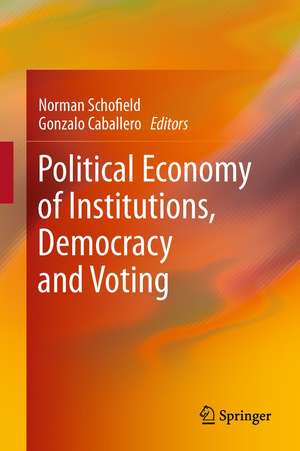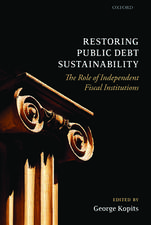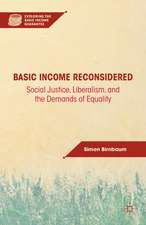Political Economy of Institutions, Democracy and Voting
Editat de Norman Schofield, Gonzalo Caballeroen Limba Engleză Paperback – 7 oct 2014
The book focuses on topics such as: case studies in institutional analysis; research on war and the formation of states; the analysis of corruption; new techniques for analyzing elections, involving game theory and empirical methods; comparing elections under plurality and proportional rule, and in developed and new democracies.
| Toate formatele și edițiile | Preț | Express |
|---|---|---|
| Paperback (1) | 647.27 lei 6-8 săpt. | |
| Springer Berlin, Heidelberg – 7 oct 2014 | 647.27 lei 6-8 săpt. | |
| Hardback (1) | 652.31 lei 6-8 săpt. | |
| Springer Berlin, Heidelberg – 12 iun 2011 | 652.31 lei 6-8 săpt. |
Preț: 647.27 lei
Preț vechi: 761.49 lei
-15% Nou
Puncte Express: 971
Preț estimativ în valută:
123.85€ • 129.66$ • 102.48£
123.85€ • 129.66$ • 102.48£
Carte tipărită la comandă
Livrare economică 05-19 aprilie
Preluare comenzi: 021 569.72.76
Specificații
ISBN-13: 9783642435133
ISBN-10: 3642435130
Pagini: 436
Ilustrații: IX, 425 p.
Dimensiuni: 155 x 235 x 23 mm
Greutate: 0.61 kg
Ediția:2011
Editura: Springer Berlin, Heidelberg
Colecția Springer
Locul publicării:Berlin, Heidelberg, Germany
ISBN-10: 3642435130
Pagini: 436
Ilustrații: IX, 425 p.
Dimensiuni: 155 x 235 x 23 mm
Greutate: 0.61 kg
Ediția:2011
Editura: Springer Berlin, Heidelberg
Colecția Springer
Locul publicării:Berlin, Heidelberg, Germany
Public țintă
ResearchCuprins
Introduction.- Institutions: Rules or Equilibria?.- War, Wealth, and the Formation of States.- Why Do Weak States Prefer Prohibition to Taxation?.- Self-enforcing, Public-order Institutions for Contract Enforcement: Litigation, Regulation, and Limited Government in Venice, 1050 - 1350.- Judicial Stability During Regime Change: Apex Courts in India 1937-1960.- Institutional Arrangements Matter for Both Efficiency and Distribution: Contributions and Challenges of the New Institutional Economics.- Institutional Foundations, Committee System and Amateur Legislators in the Governance of the Spanish Congress: An Institutional Comparative Perspective (USA, Argentina, Spain).- Coalition Governments and Electoral Behavior: Who Is Accountable?.- Democracy and Voting: Empirical and Formal Models of the United States Presidential Elections in 2000 and 2004.- Modelling Elections in Post-Communist Regimes: Voter Perceptions, Political Leaders and Activists.- Electoral Systems and Party Responsiveness.- Electoral Institutions and Political Corruption: Ballot Structure, Electoral Formula, and Graft.- A Model of Party Entry in Parliamentary Systems with Proportional Representation.- Moving in Time: Legislative Party Switching as Time-Contingent Choice.- On the Distribution of Particularistic Goods.- Vote Revelation: Empirical Content of Scoring Rules.
Textul de pe ultima copertă
This book presents the latest research in the field of Political Economy, dealing with the integration of economics and politics and the way institutions affect social decisions. The authors are eminent scholars from the U.S., Canada, Britain, Spain, Italy, Mexico and the Philippines. Many of them have been influenced by Nobel laureate Douglass North, who pioneered the new institutional social sciences, or by William H. Riker who contributed to the field of positive political theory.
The book focuses on topics such as: case studies in institutional analysis; research on war and the formation of states; the analysis of corruption; new techniques for analyzing elections, involving game theory and empirical methods; comparing elections under plurality and proportional rule, and in developed and new democracies.
The book focuses on topics such as: case studies in institutional analysis; research on war and the formation of states; the analysis of corruption; new techniques for analyzing elections, involving game theory and empirical methods; comparing elections under plurality and proportional rule, and in developed and new democracies.
Caracteristici
Presents latest research in the field of Political Economy Focuses on topics such as war and the formation of states, analysis of corruption Provides new techniques for analysing elections, including the connection between game-theoretic and empirical methods Offers a comparison of developed and new democracies, and of elections under plurality and proportional rule Includes supplementary material: sn.pub/extras














